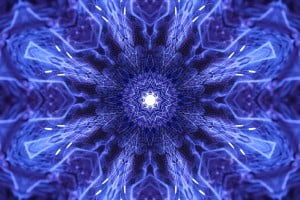So far I have written as a social scientist, one who has spent much of my life studying human societies, seeking reliable patterns and clear concepts better to understand our world. But I am also a Pagan, and my outlook is decisively shaped not only by what I have learned as a traditional scholar, but also what I learned as a Wiccan, one who also worked for many years in an African Diasporic healing tradition, as well as shamanic work rooted in Indian traditions. What I learned here takes my discussion several levels beyond what secular science recognizes. That is why I saved it for a third post. I think my first two establish the inappropriateness of using “privilege” to describe most inequities. But if I am right, these additional insights strengthen the case.
Occult dimensions
Most Pagan traditions differ from most monotheisms as well as dominant secular views in rejecting modernity’s sharp distinctions between mind and matter. Each influences the other. Sometimes profoundly.
At a mundane level scientists recently discovered using botox to prevent frowning assists many deeply depressed people. At the same time smiling has significant effects for the better on seemingly unrelated physiological functions such as blood pressure. Causality works in both directions.
More radically still, considerable research indicates our minds can perceive psychically and even have a measureable impact at a distance. Those wanting to know more can consult work by Dean Radin and Russell Targ.
These two points can account for most of the phenomena involved in magick. Much of what we call “magick” uses disciplined mental processes to influence the physical world “at a distance.” With this insight we turn to the dark side of understanding inequalities in terms of ‘privilege’.
Words have power. They express ideas and and when guided by focused will combined with strong emotional energy, ideas have magickal power. The context within which we address an issue shapes how we think about it, how we deal with it, and how we impact others.
The degree of emotional force and venom many people complaining about ‘Wiccan privilege’ brought to discussing the issue was striking. Significantly, the same pattern occurs within the feminist community, where it has operated longer than in ours, and resulted in some feminist writers ceasing to publish because of the abuse from other feminists.
During the first online discussions of ‘Wiccan privilege’ I could sometimes ‘feel’ the sharp stabs of anger and hostility accompanying some posts directed my way. Other people who had devoted their lives to serving our religion were told they were unfit. Ultimately I removed two individuals from participating because I decided they were dragging the discussion down into irrationality and venomous negativity. Left unchecked, this would drive many readers away and discourage rational Pagans from contributing. Better they go. And so they went.
But wow.
More recent rounds of discussion have been better, perhaps because those individuals did not participate, perhaps because I drew attention to the venom, perhaps both. Only one needed ousting.
In my previous essay I mentioned how in the 1970s, self-described “Black nationalists” attacked and drove away their white supporters within the Civil Rights movement. The issue of “White privilege” was central to their attacks. Soon afterwards the decline of the movement began.
This happened in the feminist movement as well. In 1976, when feminists were first attacked in this way, an article in Ms Magazine described “trashing” other feminists as “accomplished by making you feel that your very existence is inimical to the Movement and that nothing can change that short of ceasing to exist.” Trashing went beyond simple disagreement, for as Jo Freeman, the article’s author, wrote “There’s a difference between trashing someone and challenging them. You can challenge someone’s idea. When you’re trashing someone, you’re essentially saying they’re a bad person.”
The same phenomena has reappeared today in contemporary feminism. Katherine Cross, a Puerto Rican trans woman and feminist, writes being targeted “leaves you threatened in the sense that you’re getting turned out of your own home. . . . The one place that you are able to look for safety, where you were valued, where there is a lot less structural prejudice that makes you feel so outcast in the rest of the world – that has now been closed to you.” To my mind the language and tone Cross describes are identical to what we have been experiencing in our own community. Significantly, this is happening as women’s improved status in society has come under sustained attack.
Domination is the active subordination of others by keeping them powerless and divided. The civil rights and feminist movements both challenged domination in American society. Most NeoPagan religious alternatives challenge it as well. We focus on the feminine and the sacredness of the world, both of which run counter to domination as values. We and other religions sharing this focus offer attractive alternatives to the fear filled religions and their tyrannical deity so long dominant in America. We are a threat to religious domination beyond our numbers. My case for this claim is developed in my new book. Here I will only assert it.
Again the language of denunciation, anger, and contempt is growing within movements challenging the power of domination in American society. Thinking about our differences in terms of ‘privilege’ encourages and legitimates feelings of resentment and anger, turning them inwards towards the community, and further empowering them with aggressive self-righteousness. In occult terms, through their intense anger and the force of their will, without intending it the most intense denouncers are practicing the equivalent of black magic. The recipients of their anger often feel mentally and emotionally assaulted, and not simply disagreed with. To the degree the attacks succeed, people feel assaulted and leave the community or grow quiet.
Very significantly, the outrage is far out of proportion to whatever slights are named as complaints. Further the attackers claim to be the true supporters of the movement. In the Pagan case many announced they are the ‘real’ polytheists and the rest of us using the term are fakes or confused. I am not describing theological differences. There have always been radical polytheists among us and they have gotten along well with those of us who view our polytheism differently. One of our strengths as a community is that we do not emphasize doctrinal and theological issues, but rather issues of practice which people with many views can do together, each of us grasping its meaning in our own way. Instead I am describing the tone and disrespect by which those differences are stated.
An additional clue is that the attackers apparently have a zero-sum view of human relations. Prominence by one results in the ‘subordination’ or ‘marginalization’ of another. Consequently they argue in terms of power. Those who they attack have a “power structure” and against power structures the response is to demand more power for oneself.
So we have three clues as to what is happening on a deeper level. First, these assaults happen to groups challenging domination in society. Second, the responses are way out of proportion to claimed slights, real or imagined. Third, human relations are treated as zero-sum and in terms of who has the most power. Power is a connecting thread.
Power
Given the sincerity of most involved in these movements what is happening to send some at others’ throats? I think African writer Maildoma Somé captured an important dimension. I often repeat this quote because I think it is so important. “When power comes out of its hiddenness, it shrinks the person who brought it into the open and turns that person into a servant. The only way that overt power can remain visible is by being fed, and he who knows how to make power visible ends up trapped into keeping that power visible. . . .”
When we think in zero sum terms we believe we need enough power to be on the positive side of the ledger. We start thinking in terms of having the power to prevail, and how to get more.
The metaphysical side of Domination
I think at a very deep level humanity has generated and now must grapple with a powerful thought form: Domination. It is probably one entirely of our own creation.
For thousands of years civilizations have been dominated by those wielding power over others. Entire cultures have been torn apart by people seeking to gain or expand their power to dominate. If there is anything to the existence of thought forms, and I think there is, Domination is one of the most powerful, and is fed by the exaltation that comes from triumphing over others, dominating them, and also by their victim’s desire for more power themselves, to reverse the relationship.
Thought forms have access to all the knowledge of those connected to them, as was illustrated on a small scale in the Darth Vader and Grimjack investigations I wrote about.
Movements seeking to weaken domination’s role in human life threaten this force. For it to flourish they must fail. Because their message is an attractive one, they are best destroyed from within, which also discredits the message. Like a parasite, Domination’s energies might take on a superficial resemblance to its target, seducing some, in order to weaken and undermine all.
I am describing what government police agencies have done world-wide against dissidents, using agent provocateurs and sowing dissension and conflict among them. But the psychic equivalent works more deeply. We know that the FBI employed dirty tricks against Martin Luther King. But they did not seek to tear the movement apart through Black nationalists. They were afraid of them. Here is where alternative explanations make sense to me once we grant the reality of the phenomena I am describing. Those Black Nationalists were sincere activists who allowed their anger to override their judgment and became focused on power. In the process they became its servants.
In the case of the Civil Rights movement, the end result was its decline and the rise to greater influence of its most dedicated opponents. In my last essay I also described how this tactic of dividing a dominated group perpetuated the forces of domination over poor Blacks and poor Whites in the American South. Here the role of Domination is clear, for it empowers the appeal of racism to poor Whites. Under its influence for nearly 100 years after the Civil War over 5000 Black men and women were lynched, along with White supporters, and defacto slavery was re-established.
I believe all religions or other movements seeking to enlarge the heart in human life must deal with this kind of attack. Domination’s most successful tactic is appearing to be what it seeks to destroy, dividing its opponents and confusing their ability to think clearly about these issues. In my previous post I described how talk of rights, perhaps the most effective way people have found to reduce domination in their lives, has become so confused that clear thinking about them is increasingly difficult.
None of this argument addresses the intellectual or moral case against viewing the world through categories of ‘privilege.’ Parts I and II did that. This present analysis uses our knowledge of occult phenomena to understand the vehemence, vitriol and internally destructive actions that accompanies this way of thinking, and why it seems to particularly affect groups offering alternatives to domination and focusing on power.
Spiritual dimensions
Equality is an important value, but how we make sense of it reflects the spiritual context within which we live our lives.
Concern for absolute equality, and therefore suspicion and even hostility towards significant inequalities, is particularly compatible with a purely secular outlook. When this life is all any of us have, and there is no ultimate meaning to anything, significant inequalities reflect the world’s fundamental amorality and the tragedy of individual existence. There can be no second chance for the oppressed nor a setting to rights or ultimate redemption of the oppressor. As a saying popular a few years back stated, “He who dies with the most toys wins.”
If this is all we have, and a person cares about individuals, significant inequalities become morally intolerable. The Koch brothers’ wealth along with most of the rest of the .01% have more to do with their having been lucky zygotes than with any personal qualities. When we consider the countless millions living in poverty through no fault of their own, this discrepancy becomes intolerable. The same holds for other significant differences that make some people’s lives easier than others. Alternatively, like Ayn Rand, one decides some are intrinsically superior to their inferiors.
I think of spirituality as our largest context of more-than-human existence. When our lives are considered in larger contexts of meaning the situation is transformed. There are many possible spiritual contexts, and all imply different ways of making sense of inequality. But all make it less central.
• Perhaps inequality reflects karma. Previous lives led to our current one.
• Perhaps we enter our existence with specific purposes or goals to fulfill, and the circumstances we encounter are geared to achieving those purposes.
• Perhaps the world gives birth to or is a nursery or school for souls, and what really matters is our individuation and how far our hearts open in this life.
• Perhaps we incarnate to bring the world a step closer to its ultimate potential. Equality or inequality is not as important as what we do to help others with whatever we have.
• Perhaps physical existence is to enrich us at another level, and so requires our having unpleasant experiences as well as pleasant ones.
• Perhaps what we carry over to the ‘other side’ is what is compatible with love, the rest being left behind. As such focusing on inequalities can be an error if it weakens our hearts.
• Perhaps we incarnate to share our lives with loved ones and what matters are our relationships with those close to us, and not our overall standing in society.
• Perhaps we are characters in a spiritual or multidimensional role playing game, and inequalities are needed to make the game more interesting.
I have no idea what the ultimate Big Picture might be, or whether one, several, all of the above, or none constitute a part of it. I doubt anyone else does either.
I have no doubt Spirit exists, both in individual and unitary dimensions, as I have experienced them myself. I also believe many people when they report experiences different from mine. But this is a process of addition, not subtraction. That I have not had an experience is no reason to believe someone else has not. Amid all this there is a pattern most religious traditions report: the ultimate goodness of love, kindness, compassion, generosity, and peace. My own experiences indicate the same.
This teaches us that attitudes, beliefs, and emotions incompatible with these values are more removed from the most central dimensions of Spirit available to humans. Whatever the Big Picture might be, opening our hearts whenever we can is a good idea. Experiences and practices facilitating our doing so are among the most valuable we can have, and experiences and practices pushing in the opposite direction are among the most destructive.
Resentment, envy, and self-righteousness push away from the heart, narrowing it or shutting it down. In my opinion this is the ultimate spiritual poison in having the logic of ‘privilege’ come to dominate, or even play a large role, in our spiritual and religious lives. It weakens the heart, both in oneself and often in those attacked, and so further separates us from Spirit.
I think I have previously shown the language of privilege is often deeply destructive in secular contexts. How much more destructive it is when used aggressively in religious ones.
Things are not what they seem
From a spiritual perspective there is another problem.
I have found that sometimes what seemed utter disasters were ultimately blessings. I know a great many other people who have arrived at similar insights. There is a great deal of ignorance in the view that every socially recognized disadvantage I have with respect to someone else is a assault on my well-being. Evaluating life in terms of how equal we are at any given time is to misunderstand it.
My point is not to say that the misuse of power does not matter because someone’s suffering will ultimately be to their good. That is not for me or anyone else to say. Perhaps they suffer to give us a chance to act with greater kindness? But I do say that in my own case and that of others I know, a simple-minded view that misfortunes and defeats in the short run are bad in the long is just wrong.
Of course we should treat others well. Of course we should open our hearts to them as best we are able, and seek to become increasingly able. Of course we should seek to make the world a better place for others. Of course we should appreciate our advantages and use them kindly. But the logic of fighting privilege, once it has expanded to mean differences that matter, will not get us there and obscures our ability to really improve things for others.















